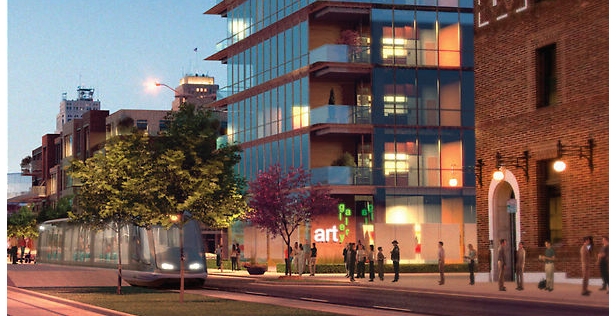The Future We Want is a planned multimedia project — short videos, traveling museum exhibit, a mobile app, maybe an Imax movie — that wants to present “a positive vision for a sustainable society.” The project bills itself as an antidote to the dystopian landscapes we see in The Day After Tomorrow, The 11th Hour, The Road, Wall-E, and the like.
 Image: The Future We Want
Image: The Future We Want
There’s a preview site now that shows attractive urban neighborhoods with broad sidewalks, sleek light-rail lines, and svelte CGI residents. The founders are looking for funding to build out the rest. Veteran energy advisor Bill Becker tipped me off to the project, which he created with real-estate imaging artist Jonathan Arnold and community planning organizer Ken Snyder.
I’m intrigued. I’ve been wondering about this sort of thing and highlighting similar works on the hunch that lots of people are convinced it’s time to move beyond our sputtering fossil-fuel dependence and on to something better, but they have trouble imagining what that “something better” looks like. Appealing visuals seem essential for overcoming their status-quo bias.
But seeing that strategy on display here, it’s sort of unconvincing. The preview videos have an upscale-chic feel that calls to mind condo ads in lifestyle magazines. Surely the future won’t all be this sterile.
To be fair, this is still the preview site. And I’ve always been more disposed to words and music than computer-generated renderings. The bigger problem, though, is the same reason Hollywood turns out so many dystopian movies. Danger alerts us, grabs our attention. Danger is sexy. Safety lulls us to sleep. It’s tough to make compelling drama out of a happy-green-prosperous future — even if that’s where we want to live.
Here’s the sort of video they want to produce. I’d love to hear what you think, readers. Is there any promise to this approach?


